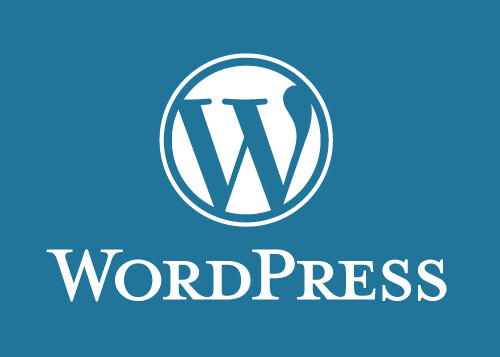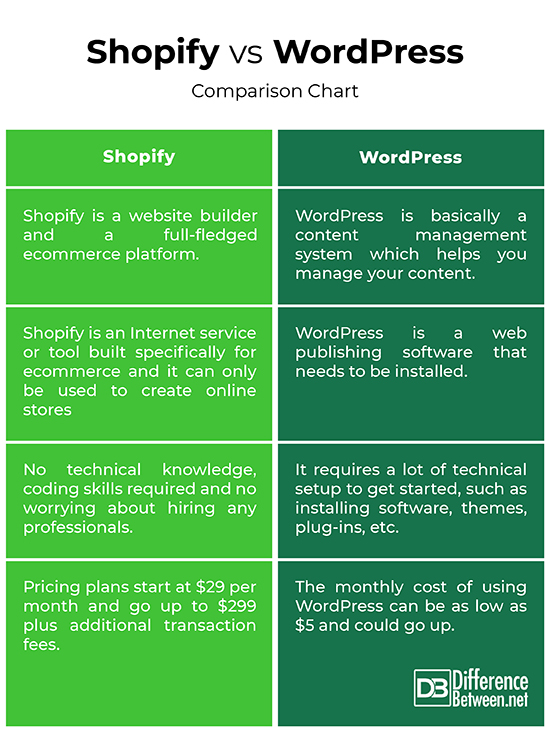Difference Between Shopify and WordPress
Ever dreamed of starting your own online business or ecommerce store? If you have, then chances are you have heard about Shopify and WordPress. While there are several ecommerce platforms out there, they remain the most prominent website builder. Let’s see how the two stack up against each other.

What is Shopify?
Shopify is a popular, all-in-one ecommerce platform and website builder that helps individuals or businesses create their own online store to expand their reach. Shopify is a proprietary, full-fledged ecommerce platform that gives you all the necessary tools to start your online store and sell products online across multiple channels. If you have ever dreamed of working independently from the comfort of your own cozy little home and running a small online business of yours, then Shopify is the perfect solution for you. The best part, you can sell almost anything on Shopify, but choosing the right products to sell is the key to become successful. Shopify does everything for you, starting from hosting your website to handle marketing and payments, and inventory management and shipping.

What is WordPress?
WordPress is a free and the most popular content management system, and the most preferred blogging platform among bloggers and content creators alike. WordPress is basically a website builder like Shopify that makes it easy to create your own website or blog. It helps you build professionally designed websites without needing to learn how to do computer programming. WordPress is just a better and less expensive way to get a beautiful, elaborate website made with a few clicks of your mouse. It started in 2003 with the aim of providing ordinary people a simple way to build a website for free. Thanks to its intuitive user interface, users can easily publish their content on the Internet. Whether you own a website or own a blog, you use WordPress to manage your content by publishing and editing it regularly on the platform.
Difference between Shopify and WordPress
Platform
– WordPress is probably the de facto standard for content management on the Internet and it has always been incredibly popular. WordPress is basically a content management system which helps you manage your content by publishing and editing it regularly on the platform. Shopify, on the other hand, is a website builder and a full-fledged ecommerce platform that gives you all the necessary tools to start your online store and sell products online across multiple channels.
Focus
– WordPress is all about content and most of the content is published with the goal of being consumed for free or at a nominal charge. WordPress is a web publishing software that needs to be installed. Shopify, on the other hand, is an Internet service or tool built specifically for ecommerce, so it can only be used to create online stores. To use Shopify, you need to visit their official website, and create and register your profile. Once you’re all set up, you can start building your ecommerce store.
Ease of Use
– Shopify is the one-stop ecommerce solution which you can use to build and customize your own ecommerce site and you can do all this without any technical knowledge, coding skills and without worrying about hiring any professionals. You can sell any goods or services on Shopify, both physical and digital ones. WordPress is also a website builder like Shopify, but it requires a lot of technical setup to get started, such as installing software, themes, plug-ins, and an ecommerce plug-in to get started with your online store operations.
Pricing
– The lowest Shopify plan is the Shopify Basic plan which costs $29 per month, while the Regular Shopify plan costs $79 per month, and Advanced Shopify is $299 per month. Shopify also takes a per transaction fee of 30¢ on top of the monthly cost of every plan. The WordPress software is available free of charge, but in order to use it, you must have to sign up for a web host and purchase a domain name. The monthly cost of using WordPress can be as low as $5 and it could go up if you hire a web designer.
Shopify vs. WordPress: Comparison Chart

Summary
Shopify is a full-fledged ecommerce solution that helps you build your own ecommerce store by offering tailor made ecommerce solutions for anyone who has absolutely no idea about coding or building a website. If you have a good business idea in mind and you know your audience, then you can use Shopify to build your own online store without any hassle. WordPress, on the other hand, is basically a content management system that helps you manage your content by publishing and editing it regularly on the platform. WordPress simply provides a simple way to build a website for free.
Should I do Shopify or WordPress?
Shopify is for anyone looking to build their own ecommerce store from scratch and without any hassle. Shopify is great for those who have absolutely no idea about coding or building a website. WordPress is standalone software that needs to be installed and it’s originally a content management system.
Is WordPress or Shopify better for SEO?
WordPress is a content management system, so it gives you more control over your content and marketing strategies than Shopify. Content does not fit the profile of Shopify, so WordPress is relatively a better choice when it comes to SEO.
Is Shopify compatible with WordPress?
There is a plug-in called WP Shopify that allows you to easily integrate your Shopify account with WordPress. It allows you to sell any Shopify product on any WordPress website.
- Difference Between Caucus and Primary - June 18, 2024
- Difference Between PPO and POS - May 30, 2024
- Difference Between RFID and NFC - May 28, 2024
Search DifferenceBetween.net :
Leave a Response
References :
[0]Sabin-Wilson, Lisa. WordPress Web Design For Dummies. New Jersey, United States: John Wiley & Sons, 2015. Print
[1]Krol, Karol. WordPress Complete - Sixth Edition. Birmingham, United Kingdom: Packt Publishing, 2017. Print
[2]Beck, Jessica Neuman and Matt Beck. WordPress: Visual QuickStart Guide. California, United States: Peachpit Press, 2009. Print
[3]Image credit: https://live.staticflickr.com/4099/4919659112_70f8836dfa.jpg
[4]Image credit: https://commons.wikimedia.org/wiki/File:Shopify_Logo.png
